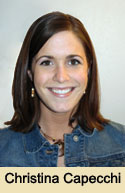Twenty Something / Christina Capecchi
Keep your year
wide open to God
 Somewhere along the line, optimism got a bad rap. It was linked to Pollyanna, and it never escaped the association. Over time, it morphed into a synonym for naiveté and ignorance.
Somewhere along the line, optimism got a bad rap. It was linked to Pollyanna, and it never escaped the association. Over time, it morphed into a synonym for naiveté and ignorance.
Meanwhile, cynicism was married to the Simpsons and hence, it became cool. To be cynical is to be savvy and witty, a wisecracking pessimist, nobody’s fool.
American public life, with its steady string of scandals, molds this cynical disposition. We, the onlookers, learn to expect the worst. If a politician is peaking in the polls, we wait for the other shoe to drop. “He’ll butcher the debate,” we predict. “A skeleton will come out of her closet.”
We’re equally cynical of actors and athletes. “She’ll be back in rehab,” we say. “I wonder how the Vikings will blow this lead.”
And we apply this thinking to our personal lives, making cynical remarks to provoke chuckles and to prepare ourselves: low expectations make for minimal disappointment.
When we fall into this mode of thinking, we don’t fret; cynicism seems to be a choice like any other. Are you a Coke or a Pepsi person? A glass half-empty or a glass half-full?
But that cliché strips outlook of its spiritual essence. Optimism is not a casual preference; it is a belief in an infinitely generous Lord who repeatedly fills the cup until it overflows.
This idea was a cornerstone of the preaching and writing of St. Francis de Sales, a 17th-century French bishop. He identified it as a virtue and gave it a wonderful name: joyful optimism.
St. Francis didn’t lead a charmed life. He knew suffering and injustice. But he also knew the greater power of God’s redeeming love and the greater possibility of God’s inspiring hope. And he worked to help others know it.
When his friend, St. Jane de Chantal, was recovering from illness, he wrote her an encouraging letter: “Keep your heart, my dear Daughter, wide open before God; always go joyously in his presence. He loves us, he cherishes us, he is all ours, this sweet Jesus.”
Francis and Jane founded a school called the Institute of the Visitation of the Blessed Virgin. Across the ocean and centuries later, Visitation students still learn about joyful optimism. It blossoms in various ways.
Take Mary Engelbreit, who attended Visitation Academy in St. Louis. If you don’t recognize her name, you’ve seen her greeting cards with their signature checks and cherries. Joyful optimism is infused in her illustrations.
Engelbreit’s art has been given a label that makes her bristle: cute. The half-compliment seems to insinuate, “What an idealistic little world you draw.”
Her response: “What’s wrong with that? Don’t you wish you lived there, too? ... What I draw is taken from my life. I honestly had a wonderful childhood.”
Despite the sorrow Engelbreit has known, she chooses to focus on the joy and to share it with others.
We are all called to practice this virtue, and the New Year offers a perfect chance. We must tackle that blank calendar with joyful optimism, keeping our hearts wide open before God.
Yes, 2008 will bring changes and challenges—in public and private spheres.
But the year also holds surprising blessings from a creative, generous God. So move toward them!
Joyful optimism begins simply: Rise each morning, inhale deeply and whisper, “Here we go, God!”
(Christina Capecchi is a freelance writer from Inver Grove Heights, Minn. E-mail her at christinacap@gmail.com.) †
 Somewhere along the line, optimism got a bad rap. It was linked to Pollyanna, and it never escaped the association. Over time, it morphed into a synonym for naiveté and ignorance.
Somewhere along the line, optimism got a bad rap. It was linked to Pollyanna, and it never escaped the association. Over time, it morphed into a synonym for naiveté and ignorance.